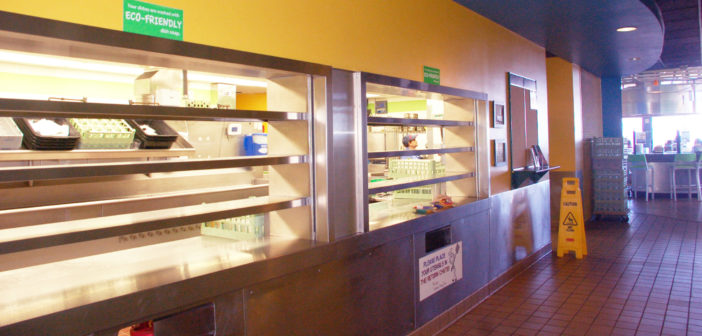Lehigh is close to meeting the Real Food Challenge, a commitment that the university will purchase at least 20 percent of “real food” annually.
According to the Office of Sustainability, real food is “local/community-based, fair, ecologically sound, or (from) humane sources.” In order to be considered local, food must be sourced within 250 miles of the university.
Lauren Sleeger, the director of Rathbone Dining, said Lehigh was at 19 percent real food earlier this year until a dairy company used by the university no longer satisfied real food guidelines. Dining Services is looking to replace the vendor, but will not do so until all options are considered.
Sustainability Officer Delicia Nahman said Lehigh has been the most successful in purchasing locally-sourced foods.
Although Lehigh is making progress, Aleksander Gulkewicz, ’20, a student member on the Office of Sustainability’s metrics and reporting team, said it can be difficult to purchase real food because smaller food producers may have trouble meeting the qualifications.
“There are very strict organic, fair trade and humane standards, and it is hard, especially for smaller businesses, to afford to get those certifications,” he said.
In the 2013-14 academic year, Nahman said Lehigh purchased about 2 percent local, fair trade and humane food. However, in the last academic year, 13 percent of Lehigh’s food supply was real food.
A pledge to the Real Food Challenge means that a university must establish a transparent reporting system to assess food purchases, which includes the production of an annual progress report, according to the Real Food Challenge’s website.
Each university must also create a food systems working group comprised of students, staff, faculty, food service managers and others who are responsible for developing and coordinating the implementation of an official real food policy and multi-year action plan.
There are a total of five commitments a university must sign in order to officially participate.
“(The Real Food Challenge) is really trying to encourage a shift in what we buy and who we buy it from, as well as support for small- and medium-sized businesses,” Nahman said.
Lehigh officially joined the challenge in 2013. There are over 40 participating schools including the University of Pittsburgh and Haverford College.
Sleeger said efforts to conform to real food sources have been pretty smoothly with only some complications in understanding data and criteria and working with food vendors.
She said even with the hit to the percentage this year, the people close to the challenge have no doubt it will be accomplished. Sleeger said Lehigh can “absolutely” meet the 20 percent real food goal by 2020.
“It has been refreshing seeing the fruits of our labor,” Sleeger said.






Comment policy
Comments posted to The Brown and White website are reviewed by a moderator before being approved. Incendiary speech or harassing language, including comments targeted at individuals, may be deemed unacceptable and not published. Spam and other soliciting will also be declined.
The Brown and White also reserves the right to not publish entirely anonymous comments.